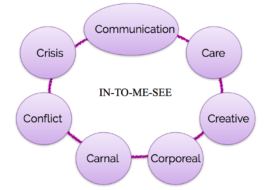There are three ages in people’s lives. Each age has its joys and frustrations, but of the three, no age has more potential for human happiness, yet is more prone to frustration, than the third age.
There are no fixed chronological divisions between the ages. The first age can last until the age of 16 or the age of 26; the second age can come to an end at 45 or 65; and the third age can begin when the kids leave home, or when people retire and gain freedom from the daily grind of working.

The first age ends when young people have the first of a series of sexual and emotional relationships which are training for their next stage. This stage is a permanent relationship in which a home, a family and an asset base is created. This stage can last for ten, twenty or more years. This is an age of consolidation.
And then, when the children grow and begin to live independent lives, the couple enter their third age. This age is where the couple have built a family, security, and now ready themselves for the rest of their lives together.
Of course, there are many exceptions to this idyllic scenario. For a start, fifty percent of all marriages in the Western World end in divorce; those couples which don’t separate often stay together in a state of emotional and physical neutrality, where much of the passion which brought them together is believed to be no longer a part of their relationship. Why? Partly because of the pressures of work and the increasing levels of debt and responsibility, men and women often become isolated within their relationship.
And yet, unlike the days of our parents and grandparents, men and women are no longer dying as they enter this third age, as better health and nutrition allows us to live far beyond our years. And lets never forget that half of all marriages in Western Society end in divorce and acrimony, which leads to emotional and sexual frustration.
But assuming that the couple stays together, and they enter this third golden age of peace, serenity and emotional companionship, one thing happens which casts a shadow over the culmination of their hopes and dreams. In most cases, sex is no longer a part of the relationship.
Of course, it’s infinitely worse for widows and widowers, divorcees or those who are suddenly single for reasons which are many and varied. In these cases, single people have to rely on sexual fantasies or, at worst, sexual sublimation, to get through their nights. The Internet and its oceans of pornography are now providing cold sexual release, but not fulfilment or happiness, to many single men and women.
But whatever the reason, sexual abstinence from a partner is a cause of frustration, depression, high blood pressure, hormonal imbalance, headaches, emotional eating, emotional drinking and much more which leads to obesity, and a plague of other problems.

Sex For the Third Age is a guide to making this third golden age of people’s lives into the most exquisite and beautiful time they have. Written by Patricia Maris, one of Australia’s leading practitioners of wellness for the elderly, it is a book which will enlighten, enliven, invigorate, educate, entertain and enthral the millions of men, women and couples who are about to, or have retired, and want to do more with their time than gardening and playing bridge.
There is no adult age at which people should stop having sex. Sex is not only essential for human health and welfare, but it is the most intrinsic and fundamental human activity. Like eating and drinking, the quality improves with sophistication and experience.
Sex For the Third Age is a book aimed at the millions of men and women with time (and money) on their hands, who wish to recapture the joys of sexual fulfilment of their younger days, yet who are too embarrassed to seek help from others.
For the past twenty six years, Patricia Maris has been helping men and women, aged from 45 and beyond, to regain and recapture the sexual and emotional libido in which they once revelled, and which was foremost in minds and bodies. She works with retirees, widows and widowers, singles and divorcees. And the over-riding comments which she hears most often in her practice is, ago….”“I wish I’d known about this ten years







